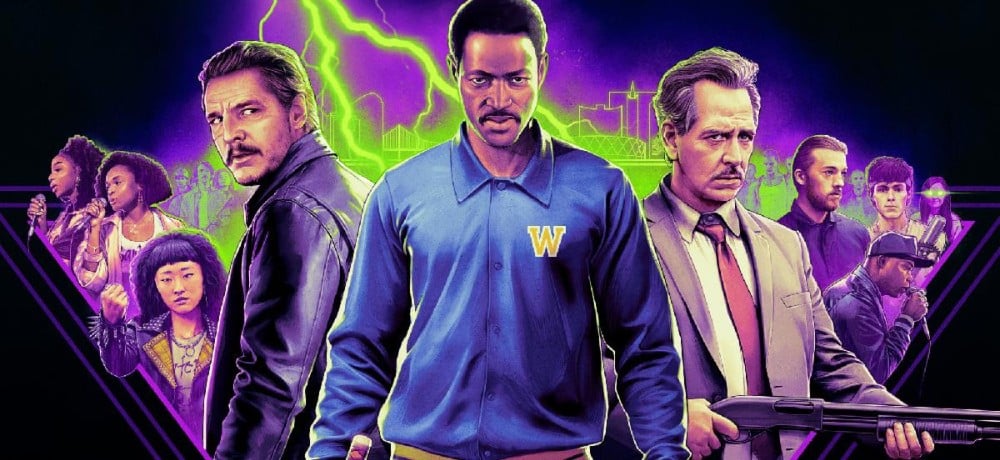






"Oakland was hella freaky." That's the tagline of Anna Boden and Ryan Fleck's California-hazy thriller Freaky Tales, a social-savvy anthology about 1987 Oakland—with a supernatural bent. The film loves to throw around the word "freaky," whether rap battles or wraparound narrations, but the film's problem is the overpromise of genre elements. Boden and Fleck tackle racism, Nazis, predatory law enforcement, and a host of other injustices throughout for stories connected by neon-green thunderbolts in the sky, but it's an exhaustingly flat marathon of inconsequentiality. Stories are desperately linear while genre elements make no sense in context, like a haphazard take on Tromaville that's somehow less sensical.
Freaky Tales is a story of punk rockers defending their concert venue, ice cream scoopers who dabble as verbal assassins, a debt collector pulled back into the business (Pedro Pascal), and NBA All-Star Sleepy Floyd (played by Jay Ellis). They're overlapping stories with interconnection spread like a web, like how anarchist teens Tina (Ji-young Yoo) and Champion (Jack Champion) tip off Sleepy Floyd as to who broke into his estate and murdered his indigestion-suffering mother. Ben Mendelsohn stars as a perverted and bigoted officer known as "The Guy," the film's main villain, who brings Hell to Oakland in the form of skinhead corruption. It's angry and pro dead Nazis—hell yeah—but also lands like an unflattering outline of violent exploitation oddities of yesteryear.
The visual appeal feels cheaply rendered and faux-midnight madness. An awful tracking fuzz filter replicates VHS quality while cigarette burns dot the screen, but it's distractingly inorganic (no Dude Bro Party Massacre III). Boden and Fleck's adoration of 1980s grindhouse cinema is evident, but the film's appearance is one-dimensional. All-out urban warfare bookends Freaky Tales with garish digital blood, while this recurring theme of a green energy from above—never explained—appears like colored pencil drawings at random. I'd imagine the filmmakers aim for a cartoonish tableaux of Oakland's chaotic underbelly, but it's more like pages torn from "Baby's First Exploitation Coloring Book."
That's not to say Freaky Tales is without standout moments. Who doesn't love watching a group of stereotype 80s Nazis get massacred by Operation Ivy stand-ins, venue managers, and spikey-haired attendees with stabby bracelets turned into neck-flesh shredders? Jay Ellis ends the film on a high note as Sleepy Floyd goes all Kill Bill on The Guy's feckless minions (including Angus Cloud, RIP), dressed in a leather Blaxploitation costume colored after the Golden State Warriors (his team). In these moments, the film enters a wackadoo realm where reality shatters far enough to embrace what gratuitous lunacy graces the screen. Plus, Mendelsohn plays an A+ creep—even just ordering a vanilla sugar cone.
The problem is Boden and Fleck's uninspiringly straightforward anthology—a collection of stories where the punchline feels more like a first-act closer with oodles more left to explore. "Strength In Numbers" details a single fight against Aryan mobs that's pure Nazi-bashing catharsis but nothing else, followed by "Don't Fight The Feeling," where Entice (Normani) and Barbie (Dominique Thorne)—Danger Zone—find the courage to rap battle local legend Too $hort (portrayed by DeMario Symba Driver). Then comes "Born To Mack," where Pedro Pascal's Clint faces the consequences of his dangerous business—beating marks senseless because of unpaid debts—in the most rudimentary representation of "back in the game" storytelling possible, which sinks like bricks. It takes a minute for "The Legend of Sleepy Floyd" to regain momentum and at least ends Freaky Tales on a high note as Floyd dispatches racist trash with his array of weapons.
It's all so disjointed, though. Entire segments play like puffy filler, there's no consistency between tones, and the throughline of this inexplicable supernatural force looming over Oakland is forgettably mishandled. Sometimes it causes a bus driven by Marshawn Lynch to fly into the sky, while other times, it appears as a single tear on a criminal's face? Actual Oakland musician Too Short, who narrates Freaky Tales, describes it as an "electricity in the air," but to me, it's more like a wasted plot mechanism that's tossed on screen whenever Boden and Fleck remember it's available. Everything's slapdash and underdeveloped, to the point where you'll be left wondering how, on top of all the actors listed, Tom Hanks shows up as a video store clerk like he's auditioning for a Kevin Smith joint.
It's a shame, but Freaky Tales is as underwhelming as a package of Oreo Thins. If you're replicating exploitation and grindhouse vibes, I want to overdose on the indulgent, cream-filled center that would push extremes. Boden and Fleck approach their Oakland-loving concept with a tame drabness, even with Sleepy Floyd's vengeance arc. Odes to Tarantino and Metallica needle drops aren't enough to win us over when the product feels like Exploitation Lite. Freaky Tales ain't freaky enough, despite how often it tries to convince you otherwise.
Movie Score: 2/5